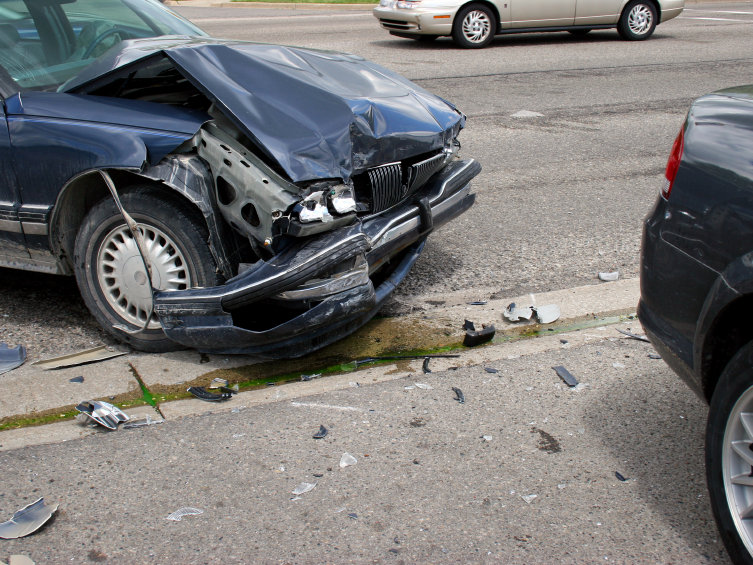It's been a few years, but the idea of mandatory car insurance once again is buzzing about the bonnets of a few lawmakers.
State Sen. John Lehman (D-Racine) is circulating a bill in Madison that would require all drivers to carry insurance providing coverage of up to $50,000 for personal injury and $10,000 for property damage.
Uninsured drivers are not exactly the scourges of the road. Lehman cites a study by the Insurance Research Council that found one in seven drivers is without insurance. About 15 percent of drivers in Wisconsin don't have insurance, according to industry reps.
Wisconsin is one of a handful of states that doesn't mandate auto insurance, unless you have certain traffic tickets and need to keep your license. That's also the reason it has one of the lowest insurance prices in the country, according to insurance expert Greg Felzer, of American Family.
Felzer said the Badger State, with an average annual rate of $613.81, ranks 47th nationally in auto insurance rates. There is a noticeable drop-off in rates between mandatory and non-mandatory states.
The insurance industry is not likely to drive headlong in support of this bill. If insurance companies have to insure all drivers, including the idiots, good drivers have to pay more because the risk would substantially increase, Felzer says. Lehman says his bill would make roads safer.
"Bad drivers are still going to be bad drivers," Felzer counters.
His advice? Buy enough insurance coverage to protect yourself and don't worry about the other guy.
In the Sewers: It wasn't with resounding support, but the Milwaukee Metropolitan Sewerage District Board picked the French firm Veolia Water to operate the two sewage plants and Milorganite facility run by MMSD.
In a 7-4 vote, Veolia beat out a bid from the unions representing MMSD workers and United Water, which has run the district for the past 10 years.
MSD staff claim the private operator will save sewer users $35 million over the decade compared to the union bid.
Not all commissioners bought that reality, however.
Board Chairman Pedro Colon said he was naturally "skeptical" of private contractors and felt that Veolia could only have come in with such a low bid by not figuring profit into the price tag. Colon said he worried that Veolia will try to turn a profit in the middle of the contract through various changes in the deal.
Board commissioners may have left some obvious questions on the cutting room floor. For instance, would Veolia commit to hiring the current workforce?
Veolia President John Wood told the committee it was the "general intent" to hire the existing staff.
St. Francis Mayor Al Richards asked one of the more outlandish questions of the day when he queried Wood if all the staff at Veolia were U.S. citizens. Wood admitted that one of the execs present at the hearing was Canadian.
His "Digital Inclusion Initiative" would also allow the city to accept contributions of old computers and software as well as have city departments send its old equipment to the Initiative as well.
There is a funding gap, however, since it was originally intended to be jump started with $150,000 from Midwest Fiber Networks as part of its Wi-Fi deal with the city. Midwest Fiber hasn't been able to get the system up and running, much less donate the $150,000. But city Department of Administration Chief Sharon Robinson says there is $330,000 ready to go to the fund for low-income Internet access, as well as 500 free Internet accounts courtesy of One Economy and AT&T.
More Nurses Hitting the Streets: A one-year grant from Columbia St. Mary's to the City of Milwaukee will help bolster the city's declining home nursing corps. The $500,000 will go toward an intensive home visit effort targeting Milwaukee's low-income population.
Most of the city's focus on low-income health through the Health Department comes from pre-natal and post-natal home visits. The department quit its involvement in two clinics -- one on the North Side and one on the South Side -- that focused on serving low-income clients after federal funding dried up for 2007. The St. Mary's grant also created the Health Department's Center for Health Equity, but funding would not continue if St. Mary's doesn't renew the grant for 2009.
Green Stumps Milwaukee: Major-party candidates make headlines when they pop into town, while Third Party candidates tend to come into our fair city under the radar. It's the American way. But Cynthia McKinney has been generating headlines of her own while in Congress and now as a candidate for president with the Green Party.
To most, McKinney is remembered for an altercation with a Capitol security guard after she forgot to wear a security pin to pass through a Capitol checkpoint. But McKinney also is known for being one of the first members of Congress to call for impeachment proceedings against President Bush. She's also known for her tenacious opposition to the Iraq War and the security measures enacted as a result. She authored several bills that challenge government secrecy and surveillance methods.
McKinney, 52, served in Congress from 1993 to 2003 and from 2005 to 2007, but she lost the Democratic primary in 2006. Backers say her own party targeted her for defeat because she wasn't marching to the tune of party leadership.
She'll be in Milwaukee stumping for the Green Party beginning at 7 p.m. Tuesday at UW-Milwaukee's Bolton Hall, room 150.
Progressives Dig Kucinich: Mainstream Democrats seem content to set up their tents in the Hillary Clinton camp, but the Progressive Democrats of America prefer a much different landscape.
In a straw poll of members taken from late November to early December, Ohio Congressman Dennis Kucinich is the overwhelming favorite. Of 15,810 votes cast, 41 percent say Kucinich is the man for the White House. John Edwards came in second with 26 percent. That seems a tad odd, since Edwards' liberal credentials are not encyclopedic in size.
Barack Obama was the only other candidate with double-digit support, coming in third with 13 percent. Clinton got nine percent, former New Mexico Gov. Bill Richardson five percent, Sen. Joe Biden three percent, Sen. Christopher Dodd and Mike Gravel each with one percent. Gravel, a former U.S. Senator from Alaska, is best known for the filibuster that brought an end to the draft as well as his reading of the so-called Pentagon Papers on the Senate floor, which landed him in front of the Supreme Court.
Sex Offenders Get a Break: A Mequon Common Council committee chose not to back a plan that would ban former sex offenders from living in the Ozaukee County suburb. Milwaukee by Ald. Tony Zielinski pushed a similar proposal. The committee dropped the idea after constitutional questions were raised. Franklin and Germantown have already passed similar rules.
An avid outdoors person he regularly takes extended paddling trips in the wilderness, preferring the hinterlands of northern Canada and Alaska. After a bet with a bunch of sailors, he paddled across Lake Michigan in a canoe.
He lives in Bay View.




